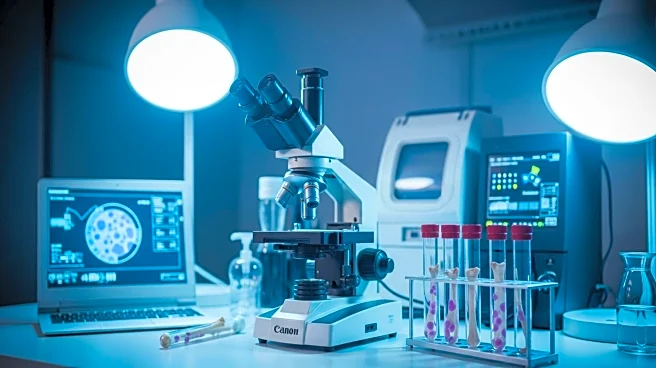What's Happening?
NASA and SpaceX are collaborating on a significant research initiative aboard the International Space Station (ISS) to study bone stem cells. This research aims to understand the molecular changes in astronauts' bones during spaceflight, which is crucial for maintaining skeletal health on long-duration missions. The study involves astronauts Kimiya Yui from JAXA and Zena Cardman from NASA, who are unpacking and installing new scientific equipment delivered by the SpaceX Dragon cargo spacecraft. NASA Flight Engineer Jonny Kim is processing bone stem cell samples in the Kibo laboratory module, using a therapeutic agent to study space-induced bone loss. The samples will be returned to Earth for further analysis. Additionally, the SpaceX Dragon spacecraft has boosted the ISS's altitude, demonstrating its capability to maintain the station's orbit.
Why It's Important?
This research is vital for the future of long-duration space missions, as it addresses the challenge of bone density loss in microgravity. Understanding and mitigating bone loss is essential for the health and safety of astronauts on missions to the Moon, Mars, and beyond. The collaboration between NASA and SpaceX not only advances scientific knowledge but also strengthens partnerships in space exploration. The findings could lead to new treatments for bone loss, benefiting not only astronauts but also individuals on Earth suffering from osteoporosis and other bone-related conditions. This research underscores the importance of international cooperation in advancing human spaceflight capabilities.
What's Next?
The bone cell research will continue with further analysis of the samples once they are returned to Earth. The results could inform the development of new countermeasures to protect astronauts' health on future missions. Additionally, the successful altitude boost by the SpaceX Dragon spacecraft may lead to more frequent use of this technology to maintain the ISS's orbit, ensuring the station's longevity and continued scientific output. The ongoing collaboration between NASA, SpaceX, and international partners will likely expand to include more complex and diverse research projects, furthering our understanding of living and working in space.
Beyond the Headlines
The research has broader implications for biotechnology and pharmaceuticals, as studying bone loss in space can lead to breakthroughs in understanding bone health on Earth. The use of space as a laboratory for biological research could accelerate the development of new medical treatments and technologies. Furthermore, the collaboration highlights the growing role of private companies like SpaceX in supporting and advancing government-led space initiatives, potentially leading to more cost-effective and innovative solutions in space exploration.









